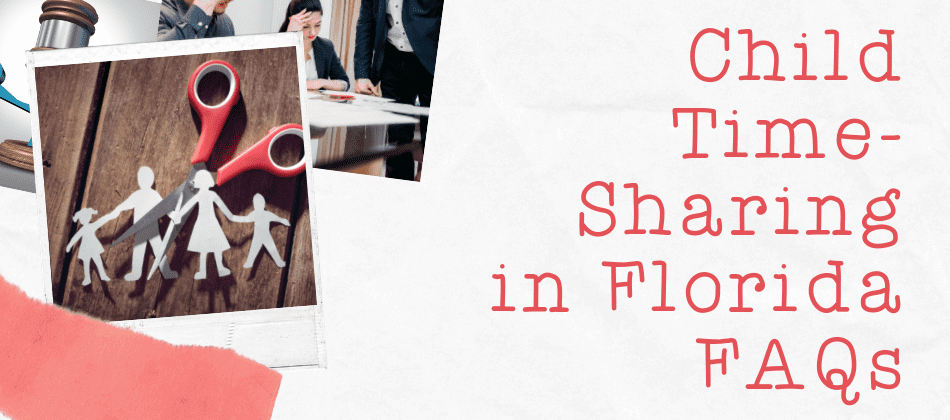Custody agreements are complicated. Before you and your partner make a child time-sharing agreement, there are a few things that you should know. Find out everything that you should know about child time-sharing custody in Florida.
- 1. What is the Goal of Child Time-Sharing Custody?
- 2. What is the Difference Between Time-Sharing and Parental Responsibility?
- 3. What is the Most Common Result in a Child Time-Sharing Agreement?
- 4. Can a Parent Get Sole Custody?
- 5. What Factors Affect the Time Share?
- 6. Can You Change Your Time Share Agreement?
- 7. Do You Need a Lawyer?
1. What is the Goal of Child Time-Sharing Custody?
One of the most important things to understand is the purpose of this type of agreement. A time-sharing agreement refers to the amount of time a child spends with each parent. When you create a time-sharing agreement, it specifies how much time the child will spend with each parent. The goal is to create a legal document that awards each parent (or only one parent) a certain amount of time. Around 2008, Florida overhauled the language used and instead of using child custody which is the most commonly used term, the courts began to use term time-sharing and parental responsibility to more accurately describe the co-parenting structures after a divorce.
Another goal is to create an agreement that has the child’s best interest at heart. When it comes to child custody, the court cares mostly about the child. They want to do whatever is best for the child.
2. What is the Difference Between Time-Sharing and Parental Responsibility?
While time-sharing refers to the amount of time a parent spends with a child, parental responsibility is quite different. The term refers to decision-making for the child. For example, it could involve deciding which school a child attends, her medical care, or her religion. In some agreements, one parent could get equal time with a child but less parental responsibility. Like other issues in child custody cases, the decision depends on a variety of other factors.
3. What is the Most Common Result in a Child Time-Sharing Agreement?
Every custody court case varies. With so many factors affecting the outcome of the case, it is difficult to say how your case will turn out. However, there is a general trend in Florida of which you should be aware. The state tends to favor equal parenting and equal time-sharing custody decisions. Therefore, you need to fight hard if you want another outcome.
4. Can a Parent Get Sole Custody?
Although the court does favor an equal timeshare, it is possible to seek and get sole custody. However, this can take some effort. Your lawyer needs to prove that being with you and you alone is in the best interest of the child. If he can prove this, then you still won’t be able to end the child’s relationship with the other parent. The only situation that warrants that is an extreme situation. For example, contact with that parent could be unsafe. In this situation, the court might agree that the child should have no contact with the father.
Often, the court will allow a non-custodial parent to visit his child. In fact, he can usually have overnight visits. However, the court could require supervised visitations. Under these circumstances, the parent can only visit the child when a third-party supervise the visit.
5. What Factors Affect the Time Share?
There are several factors that a judge considers before she decides on a timeshare agreement. Although there are other factors that she could consider, here are a few common ones:
- The willingness of a parent to encourage a relationship between the child and the other parent
- A parent’s willingness to honor the time-sharing schedule
- The ability of each parent to put their own needs after the child’s needs
- Whether the home environment provides stability for the child
- The physical, emotional, and mental health of each parent
- Any past troubles, like child abuse, domestic violence, or child endangerment
- The desire of the child, if the child is old enough to decide (usually at the age of 12)
- A parent’s willingness and ability to participate in a child’s education and other activities
6. Can You Change Your Time Share Agreement?
When you create a timeshare agreement, it is a legal document. As such, you cannot change it without going back to court. In order to gain approval, you need to show that there has been a major change in the circumstances. The court will then review and decide whether or not it is in the child’s best interest.
However, you and your ex-partner can change the agreement on your own. It won’t be legally binding, but you are free to make your own decisions. The agreement will only be enforced if you or your partner go to court and complain that the other parent violated the agreement. For this reason, you should be cautious about modifying the agreement. If possible, you should do it through the court.
7. Do You Need a Lawyer?
The court does not require you to have a lawyer in your child custody case. However, you leave a lot at risk without a lawyer. Your child time-sharing agreement tells you how much time you can spend with your child. If you don’t have a lawyer, you could end up with less time than you deserve. It’s best to prepare yourself and go to court with a lawyer who has experience.
Lewert Law is dedicated to making sure that you create a time-sharing schedule and parental responsibility agreement that is practical and in the best interest of the child. Whether you are creating a new agreement or modifying a current one, we are here for you every step of the way.

